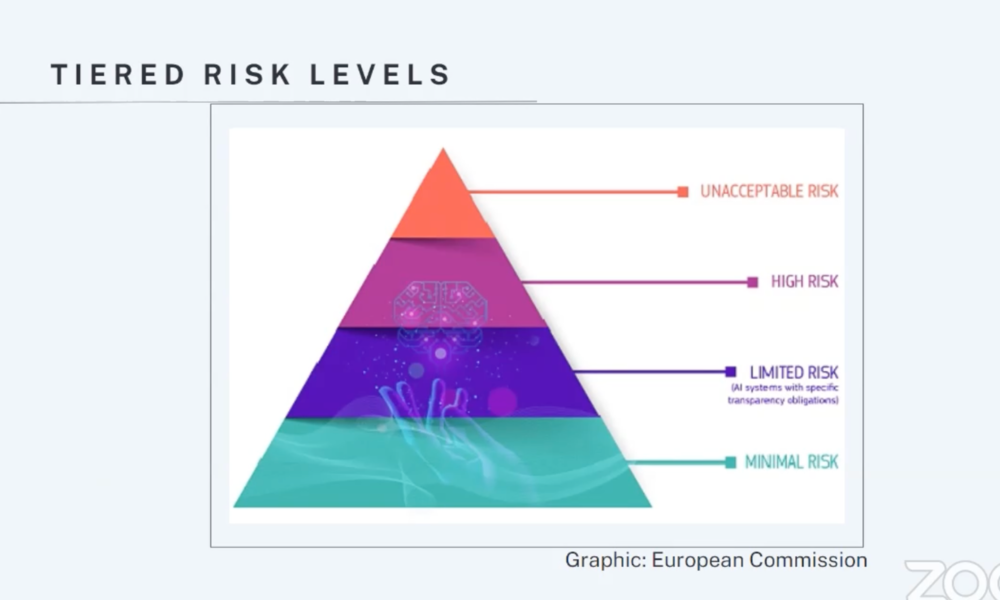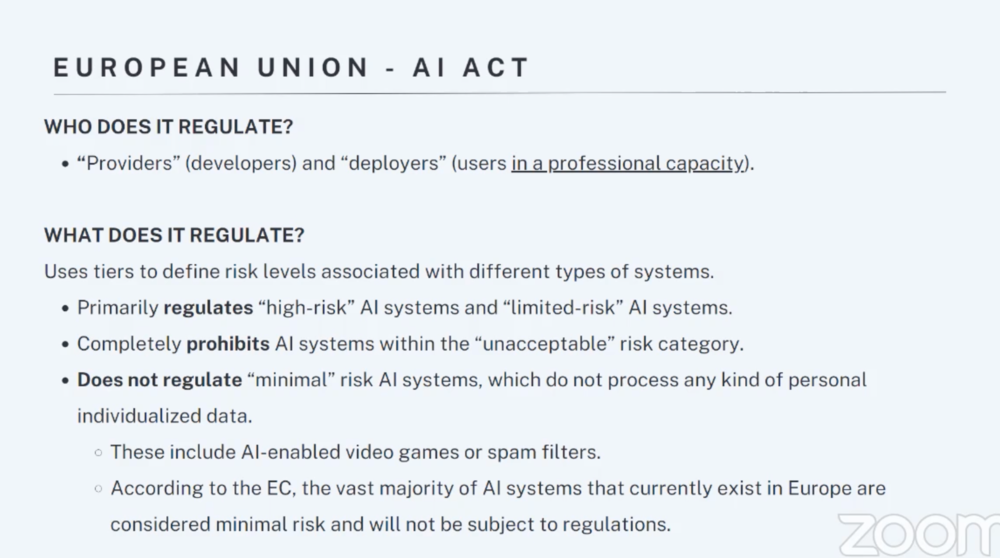
Caption
The European Union's AI Act details tiered risk levels of the new technology. The U.S. has not yet meaningfully regulated AI.
Credit: Screenshot
LISTEN: Chairman Sen. John Albers discusses the opportunities AI could bring to Georgia and the danger surrounding it as the Senate Study Committee on Artificial Intelligence looks into it.

The European Union's AI Act details tiered risk levels of the new technology. The U.S. has not yet meaningfully regulated AI.
On Wednesday, June 26, 2024, the Senate Study Committee on Artificial Intelligence met for its first meeting.
Created from Senate Resolution 476, the study committee will dedicate seven to eight meetings to look at AI, its current and future in Georgia, and the concerns surrounding it in society.
Committee chairman Sen. John Albers, a Republican from Roswell, will lead the committee over the next few months. Albers spent over 30 years working in the technology field as a chief information officer, a chief information security officer and a marketing officer. Albers also serves as the chair of the Senate Public Safety Committee.
He opened the meeting with a statement about the importance of integrating AI in Georgia and the opportunities that could come from that while highlighting the possible “evil” surrounding AI.
“This is obviously an important issue,” he said. “It’s becoming a part of the fabric of our society, and there are huge opportunities we celebrate in Georgia being the No. 1 place to do business for over a decade right now. I will tell you that I believe the only way we will stay the No. 1 place to do business is if we are going to be the No. 1 place for artificial intelligence in the future as well. I believe they will work together hand in glove.”
"However, it also has the propensity to do great harm and evil, and we have seen some of that already," he said, referring to deep fake technology — realistic-looking but false video footage of real people — being used "on everything from young school children up to elections and campaigns and everything in between.”
The rest of the study committee includes:
The meeting also included a presentation from Hayley Williams, director of the Office of Policy and Legislative Analysis, on the laws and policies on AI in Europe and the U.S.
“Just looking at AI and the law, it’s just a very complex universe to deal with, and it’s very difficult to regulate," Williams said about the United States on creating laws regulating AI. "There is a lot of pushback on regulating it at all because they’re worried that the rules will be too complex and too vague, and it will stifle innovation. But the impact is just too huge to not regulate."
The only major bill on AI to pass so far in America was in Colorado this year. That legislation, which Williams said “is not sweeping or comprehensive in any way,” is limited to the use of AI in company decision-making and to protect the public from the risks of algorithmic discrimination.
“The U.S., at a federal level, has no AI legislation so far because there is no legislative foundation to regulate this,” Williams said on the difference between the U.S. and Europe in AI legislation.

A presentation slide on the European Union AI Act.
The European Union (EU) adopted the AI Act in May, a first-of-its-kind regulatory package that establishes “obligations for providers and users depending on the level of risk from AI.”
Williams explains that the AI Act assigns a risk to a given type of AI system.
“The risk that it poses determines the type of regulations it’ll be subject to,” she said.
Most AI systems that the AI Act regulates are categorized into high-risk categories, meaning that they deal with sensitive information, such as critical infrastructure like transportation systems, education and vocational training like automatically scored online exams and more.
“Because this stuff deals with sensitive information or activity, it’s considered high risk, and they have to go through more strict requirements to be put on the market,” Williams said. “So, they have to do things like register with this database, and they have to establish these clear systems that they are going to maintain to make sure they are producing the most trustworthy AI as possible.”
From there, the idea is that AI enforcement authorities oversee the activity in the market.
In the final half of the committee meeting, the study committee looked through a list to determine the top 10 areas it wanted to target during its session when discussing AI.
“I want to find us a framework that does not stifle innovation but provides parameters and protections — guardrails, if you will,” Albers said.
The original top 10 areas that the committee will focus on in its discussion about AI include:
Sen. Jason Esteves, a Democrat from Atlanta, proposed that as the committee looks through the list, they prioritize the safety and well-being of Georgians.
“My opinion, though, is that one of the primary functions of government is to make sure its citizens are protected, and you mentioned, Mr. Chairman, that AI is the comparison to a wheel,” he said. “It’s transformational. It will change the trajectory of human history, and with that, we should ensure that in addition to supporting AI, we protect citizens from potential impacts of AI.”
Sen. Max Burns, a Republican from Sylvania, said the committee’s goal in approaching AI focuses on how they can support AI in Georgia rather than only regulate it.
“I think one of the things we heard a lot is about how the EU is taking a very regulatory approach toward AI,” he said. “Our goal would be to support AI, innovation, and expansion appropriately so that it’s good for Georgia, Georgians, and our nation. I think we can do that, but we don’t need to take the approach of restrictions as opposed to innovation.”
The Senate Study Committee on AI scheduled its next meeting for July 17 at 10 a.m.